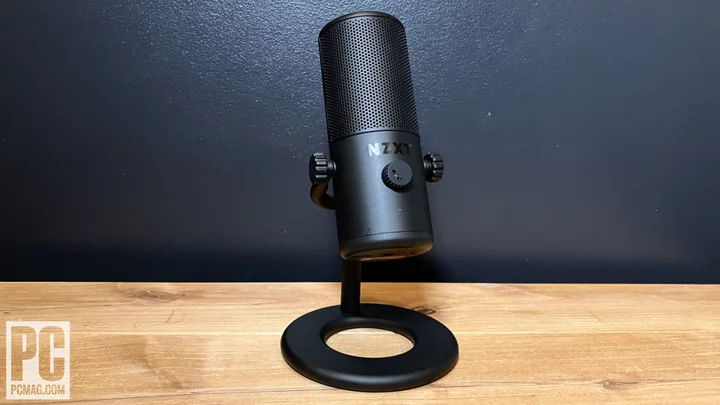NZXT’s $69.99 Capsule Mini USB microphone delivers a crisp audio signal and works fine for everything from streaming, to podcasting, to recording basic music tracks. But downsides such as limited onboard controls, a Windows-only companion app, and a non-locking swivel mount are hard to look past. You're better off budgeting a bit more for our Editors' Choice award winner, the Joby Wavo Pod ($99.99), which has superior controls, a sturdier construction, and multiple recording patterns.
A Bare-Bones Design
Available in matte black or white, the Capsule Mini looks handsome. When it is attached to the included, swiveling desktop stand, the combination measures 7.3 by 3.9 by 3.9 inches (HWD) and weighs 1.2 pounds. The stand has a circular, rubber-lined base that keeps everything in place on flat surfaces, but it can't fully lock the mic into a specific swivel position, so it's not a particularly stable recording platform.
(Credit: Tim Gideon)The upper portion of the side-address-style microphone features two grilles: a forward-facing one with small perforations and a rear-facing one with larger cutouts. Behind the grilles, a cardioid-pattern condenser capsule captures a frequency range of 100Hz to 10kHz at up to 24-bit/48kHz quality. For comparison, the Joby Wavo Pod offers the same audio quality and both cardioid and omnidirectional modes.
On the front, below the NZXT logo, there's a headphone volume knob that doubles as a mic mute button, along with a status LED. The light turns red when you mute the mic and glows white when it is active. The bottom of the mic includes a 3.5mm connection and a USB-C port for the included USB-C-to-USB-A cable. If your laptop has only USB-C ports, you'll have to supply your own USB-C-to-USB-C cable. Missing is a gain knob, something you get on the JLab Talk Pro.
(Credit: Tim Gideon)If the stand doesn't work for your needs, you can also purchase a Boom Arm Mini accessory from NZXT ($69.99). I didn't test this add-on, but the mic ships with a threaded adapter, so it should be simple enough to attach it to the boom arm and whatever other stands or shock mounts you want to use.
NZXT Capsule Mic App Experience
The Windows-only NZXT CAM app is free to download but offers just basic functionality. With it, you can change the gain levels, adjust the mix between the playback audio and the mic signal, and tweak the sidetone level (how much of your voice you hear when you speak into the mic). But the main purpose of the app is for tweaking system settings for gaming, so there's not much value here.
(Credit: Tim Gideon)The lack of macOS compatibility for this app and the limited onboard controls mean that Apple users effectively can't adjust the gain, blend the mix of inputs, or control sidetone for the mic at all. You might be able to adjust gain in your recording software, but that workaround shouldn't be a requirement.
Quality Recordings, But Some Operational Concerns
I connected the Capsule Mini to an iMac and set it up with GarageBand for testing. The signal is crisp and presents the mids and highs with solid intelligibility. It sounds relatively transparent, so there seems to be only slight EQ sculpting. I didn't notice much in the way of squashed dynamics when I spoke particularly loudly or close to the mic either, which points to just subtle digital signal processing to avoid clipping.
Recordings to the Capsule Mini sound most similar to those from DSP-free mics like the Snowball Ice rather than brighter, more sculpted options with multiple presets, such as the Shure MV7.
You don't get a pop filter in the box, but I didn't need one in testing. The capsule has enough internal shielding that plosives are not a concern in most scenarios.
(Credit: Tim Gideon)As mentioned, the knobs on the desktop stand's swivel mount don’t tighten enough to keep the mic perfectly rigid. This is concerning because it's easy to jostle the lightweight mic with inadvertent movements, such as a tug at the headphone cable. Additionally, the headphone volume knob turns and clicks somewhat noisily. To get the best results when you record, try not to move around much and don't touch the onboard controls. Neither of these flaws is a deal breaker, but they aren't something you have to worry about as much with the Joby Wavo Pod.
A Crisp Signal Isn't Enough
The NZXT Capsule Mini records a decent-enough signal, but it's light on controls and features. The Joby Wavo Pod remains a more compelling budget-friendly option thanks to its better onboard controls, multiple recording patterns, and more stable feel. As such, it remains our Editors' Choice winner in this price range.

